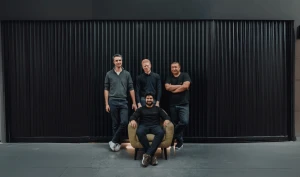الدورات
title
Roon Raises $15M to Replace ‘Dr. Google’ with Real Doctors Sharing Videos About Illness Treatments

Vikram Bhaskaran, formerly leading creator partnerships at Pinterest, found himself searching for reliable information about his father’s ALS diagnosis—a rare, terminal neurodegenerative disease—during a time of personal crisis. His experience led him to realize how difficult it was to find trustworthy, clear information about medical conditions on the internet.
“It turned my world upside down,” Bhaskaran said. He would spend evenings googling treatments and participating in Facebook groups, but he found that most health information online was overwhelming, confusing, and often unreliable. Despite being surrounded by brilliant minds in Silicon Valley, Bhaskaran felt the healthcare system was stuck in the "dark ages."
In response, Bhaskaran teamed up with two friends—Rohan Ramakrishna, a neurosurgeon at Weill Cornell Medicine, and Arun Ranganathan, a Pinterest engineer—to create Roon, a platform that provides medically accurate, complex health information. Unlike platforms like WebMD and Healthline, Roon features video-based Q&As created by doctors from leading medical institutions, answering thousands of health questions in easy-to-understand formats.
The platform aims to replace the often unreliable “Dr. Google” by offering answers to commonly asked medical questions directly from healthcare professionals. Dr. Ramakrishna, who has worked with many patients, explained that doctors often answer the same set of questions in appointments, but that information isn't widely shared outside of clinical settings. Roon aims to make this information accessible to everyone, whenever they need it.
Currently, Roon offers over 16,000 short videos on topics like ALS, glioblastoma, dementia, polycystic ovarian syndrome (PCOS), fertility, and family building. The platform plans to expand its content in the coming months, covering areas such as women’s health (menopause, breast cancer, and gynecology), pediatrics, cancer, neurology, and metabolic health.
For Bhaskaran, Roon is a platform for doctors to become creators. While doctors are compensated with an honorarium for their participation, Roon is not designed to turn them into social media influencers or well-paid content creators. Instead, doctors join Roon to share their expertise and provide educational content for patients.
Bhaskaran believes that Roon helps doctors save time and improve patient care by offering a way to supplement in-person consultations. For instance, doctors can share videos before or after appointments to help patients better understand their conditions and treatment options.
The platform’s appeal to patients lies in the fact that they are getting advice from real doctors and hearing from others who are dealing with similar health challenges. Though Roon has yet to generate revenue or finalize its business model, the startup has raised $15 million at a $68 million valuation, co-led by Forerunner Ventures and FirstMark, with additional backing from Sequoia Capital and TMV.
Eurie Kim, managing partner at Forerunner Ventures and a caregiver to her mother during her battle with cancer, sees Roon as an empowering tool for patients. "You don’t have a lot of time with your surgeon or your doctor, and so when they say, ‘Do you have any questions for me?’ you panic," Kim said. Roon provides patients with the information they need to be more prepared for appointments and make more informed decisions about their care.
As for monetization, Kim suggests several potential routes. Roon could sell advertisements or offer a subscription service for hospitals and medical practices that want to share educational videos with their patients. The platform could also expand into a doctor directory or a second opinion service, helping patients find the right medical professional for their needs.
In Kim’s view, the success of platforms like Roon comes from building trust and providing the right content. Once a loyal user base is established, the business model will become clearer. "You got to start with the content, you got to start with the trust, the right information, and then grow from there," she said.



